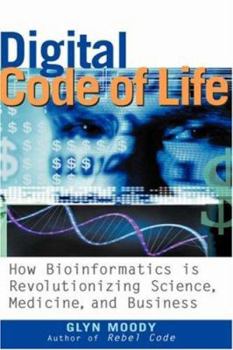Digital Code of Life: How Bioinformatics Is Revolutionizing Science, Medicine, and Business
Select Format
Select Condition 
Book Overview
A behind-the-scenes look at the most lucrative discipline within biotechnology
Bioinformatics represents a new area of opportunity for investors and industry participants. Companies are spending billions on the potentially lucrative products that will come from bioinformatics. This book looks at what companies like Merck, Glaxo SmithKline Beecham, and Celera, and hospitals are doing to maneuver themselves to leadership positions in this area. Filled with in-depth insights and surprising revelations, Digital Code of Life examines the personalities who have brought bioinformatics to life and explores the commercial applications and investment opportunities of the most lucrative discipline within genomics.
Glyn Moody (London, UK) has published numerous articles in Wired magazine. He is the author of the critically acclaimed book Rebel Code.
Bioinformatics represents a new area of opportunity for investors and industry participants. Companies are spending billions on the potentially lucrative products that will come from bioinformatics. This book looks at what companies like Merck, Glaxo SmithKline Beecham, and Celera, and hospitals are doing to maneuver themselves to leadership positions in this area. Filled with in-depth insights and surprising revelations, Digital Code of Life examines the personalities who have brought bioinformatics to life and explores the commercial applications and investment opportunities of the most lucrative discipline within genomics.
Glyn Moody (London, UK) has published numerous articles in Wired magazine. He is the author of the critically acclaimed book Rebel Code.
Format:Hardcover
Language:English
ISBN:0471327883
ISBN13:9780471327882
Release Date:February 2004
Publisher:Wiley
Length:400 Pages
Weight:0.05 lbs.
Dimensions:1.3" x 6.3" x 9.3"
Customer Reviews
3 ratings
Worth Reading
Published by Thriftbooks.com User , 16 years ago
As the other reviewer notes, this book does what it's meant to do: give you an overview of the myriad developments in bioinformatics since its inception. It's fairly engaging, though, for me, that's mostly due to the subject matter itself and not the writer's abilities. This is why I gave it four stars instead of five. The scientific explanations are usually not that great, even if the concepts aren't that difficult to understand given some understanding of the underlying biological concepts. I had to quit reading and go in Wikipedia to understand some of these concepts because I felt the author's explanations were just unnecessarily confusing. And the author often decides to jump from the narrative and devote a page to the science, which isn't a horrible thing to do, but I feel maybe the science could have either been explained more succinctly or integrated with the narrative better. So that, along with the worst proofreading I've encountered in a published book (multiple instances of missing words [like 'a' or 'the'], missing punctuation [periods, parentheses], inconsistent punctuation, etc.), prompts me to give a four-star rating. That said, it's certainly worth reading; and, from what I've surmised, it's the only published book on the history of bioinformatics (that isn't solely concerned with the Human Genome Project), so it's not like there are (m)any alternatives. I'll also note that even though this was published a few years ago, it feels slightly outdated already due to the perpetual advances in throughput and methodology in the field. A new edition (at least with an afterword explaining recent advances) would be nice.
A delightful reading
Published by Thriftbooks.com User , 19 years ago
It's been a while since I read this book. So I try to get back on my impressions. The book has a good sketch on the key developments of modern genomics and bioinformatics, full of gossips and vivid stories. It is a very difficult job to write a history or something close to that for a fast evolving field. And there are limited accounts on the business side too. To her credit, the author has done an excellent job. I had concerns over the accuracy and coverage of some contents and opinions. But given the breadth of the book, probably this is how good it can get. Other than that, it was a very interesting reading. I recommended it to a friend right the way.
Excellent Laymen's overview
Published by Thriftbooks.com User , 20 years ago
Digital Code of Life is an excellent overview of the convergence of IT and life sciences which has occurred nearly overnight. In the space of a few short years, the human genetic code has been mapped, and we now are seeing how this will play out for healthcare, drug development, and the marketplace. If you are interested in getting a sense of what is behind all the headlines, it's a worthwhile read.






